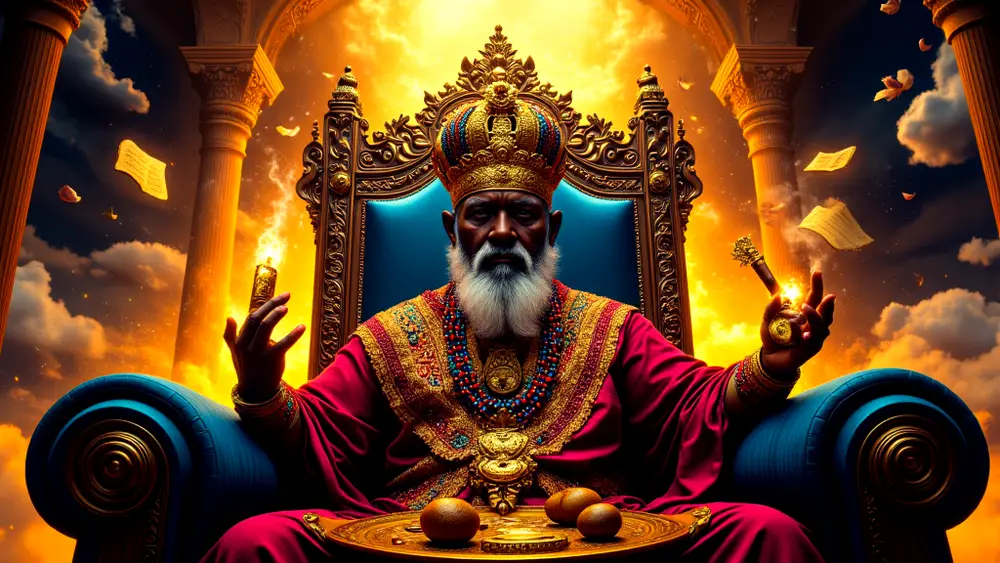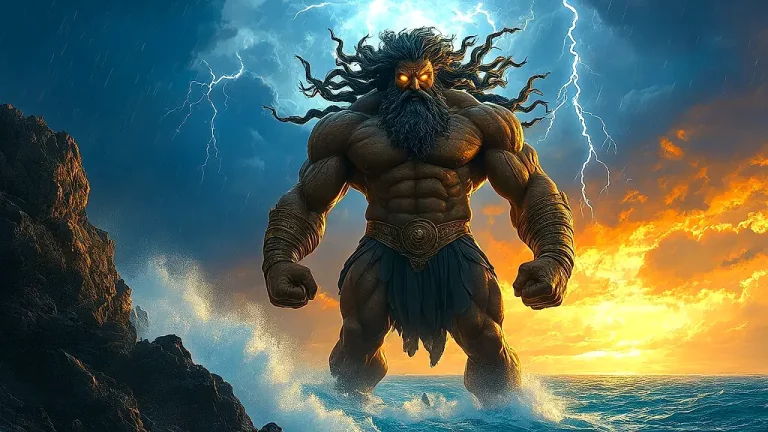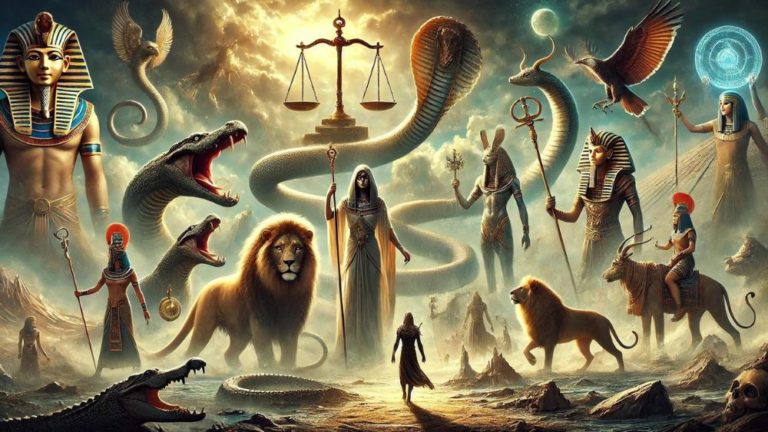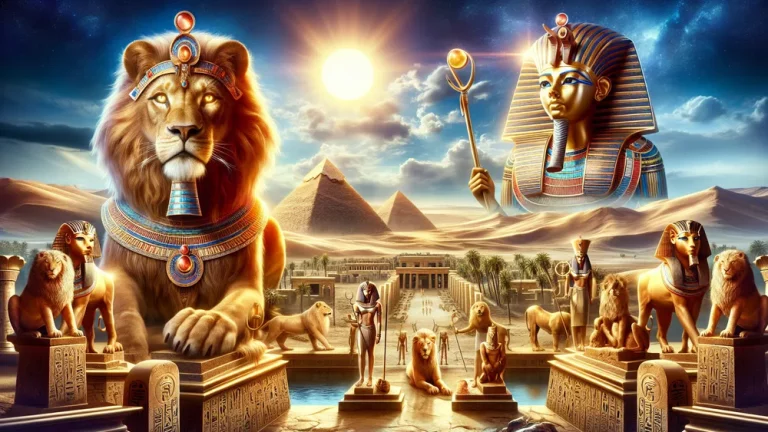Orunmila: Yoruba God Of Wisdom, Divination, And Ifá
Do you ever feel lost and need advice? In Yoruba mythology, Orunmila is the god of wisdom and divination. He helps people understand their future by using the Ifá divination system. People respect Orunmila because he saw the world being made. He also knows the destiny of every person. He has many stories. He uses tools like the Opele chain.
Key Points:
- Orunmila is the Yoruba god of wisdom and divination, known for seeing the world’s creation and knowing everyone’s fate.
- He created the Ifá divination system, which uses 256 sacred verses called Odus to guide people.
- Important tools in Ifá include the Opele chain and Ikin palm nuts, used by priests to read messages.
- Orunmila stands out among Yoruba gods like Obatala (creator) and Shango (justice) because he witnessed and recorded all destinies.
- Stories tell how he solved problems, like finding a lost prince and dealing with Eshu, the trickster god.
- People honor him with white cloth, kolanuts, and palm oil, symbols of purity and wisdom.
- Unlike other gods, Orunmila’s role is unique—he connects humans to divine knowledge through Ifá.
He is important among other Yoruba gods, such as Obatala (who represents wisdom) and Shango (who stands for justice). People rely on Orunmila for both spiritual and everyday guidance. If you are new to mythology, or if you study Ifá divination, this guide will help. You will learn about Orunmila’s origins, his sacred duties, and why he still matters today.
We will not repeat the same old stories. Instead, we will focus on what makes him unique.
Orunmila: Overview and Key Facts
| Aspect | Details |
|---|---|
| Name and Epithets | Orunmila (also spelled Orúnmìlà or Orunmilá). He has other names: Ìrúnmọlẹ̀ (“divine witness”), Elérí Ìpín (“witness of fate”), and Agbọ́nnírègún (“one who predicts the future”). |
| Domain | He is the god of wisdom and divination. He wrote down every person’s destiny when the world began. |
| Origins | People believe he is Olodumare’s child. Some say he was there at creation. Others say he appeared later as a messenger between gods and humans. |
| Symbols | – Ikin: Sacred palm nuts used in Ifá divination. <br> – Opele chain: A tool for divination made of seeds or metal. <br> – White beads: They stand for purity and wisdom. |
| Role in Pantheon | He is the wisest being after Olodumare. Shango rules thunder, and Ogun rules iron, but Orunmila controls knowledge and destiny. |
| Ifá Connection | He created the Ifá system, which includes 256 sacred verses called Odus. People often use his name and Ifá interchangeably. |
| Cultural Influence | He is important in Yoruba, Santería (where he is linked to St. Francis), and Candomblé. His teachings affect ethics, medicine, and leadership in Africa and beyond. |
| Notable Myths | – He saw creation and wrote human fates. <br> – He taught people how to use Ifá divination. <br> – Stories show him solving fights between gods, like with Eshu, the trickster. |
Orunmila’s Beginnings and Sacred Duties
To see why Orunmila matters so much, we should first look at where he came from. We also need to understand what his sacred duties are.
How Orunmila Came to Be
Picture this: Orunmila was there when the world began. He wrote down everyone’s fate. Most stories say Olodumare made him directly. Some say he appeared later as a messenger. But all stories agree on one thing. He was the only god who saw and recorded the meeting where all human destinies were decided. This is why people call him Eléri Ìpín (“Witness of Fate”).
Orunmila has three main jobs that define who he is:
- Prophet: He works as a messenger between gods and humans. He explains Olodumare’s messages through the Ifá system.
- Fate-Keeper: He keeps track of all destinies (Àyànmo). These were written when the world began.
- Divine Witness: He has special power because he saw creation happen. He confirms what is truly sacred.
These roles connect in Yoruba beliefs. Together they make Orunmila the most important source of knowledge – both human and divine.
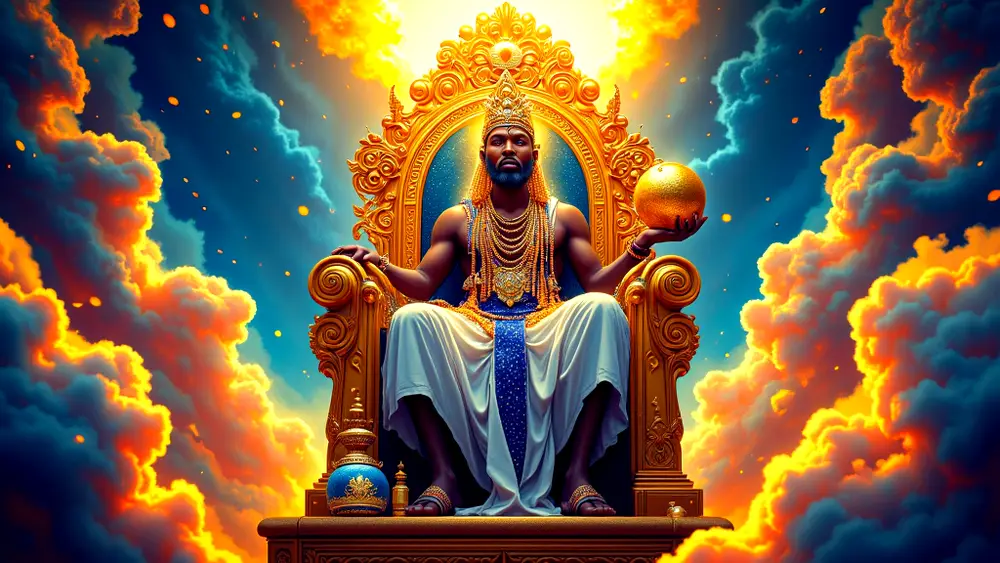
Orunmila knows every person’s fate because he was there when destinies were decided, making him the key link between gods and humans.
Where Orunmila Fits Among the Yoruba Gods
In the group of Yoruba gods, Orunmila is the record keeper. He is the only one who can check the original plans of creation. Obatala made human bodies. Shango keeps order with thunder. But Orunmila has a special role. As Eléri Ìpín (“Witness of Fate”), he can look at the first records of fate. This makes him necessary when gods or humans have problems to solve.
Here’s how these three main gods work together:
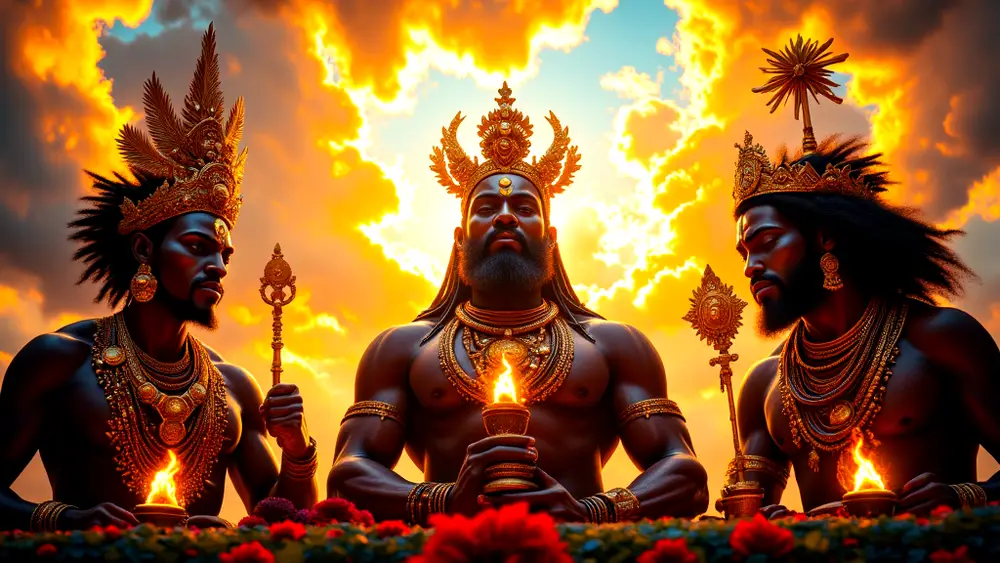
| Deity | Main Role | Symbols | What They Do | How They Relate to Orunmila |
|---|---|---|---|---|
| Obatala | Wisdom, Creation | White cloth, mountain | Makes physical forms; helps artists | Both are wise, but Orunmila knows the future |
| Shango | Justice, Thunder | Double axe, red colors | Punishes wrong actions | Needs Orunmila’s divination to judge fairly |
| Orunmila | Divination, Fate | Ikin nuts, Opele chain | Reads and keeps creation’s plans | Only he saw creation happen |
This shows why people ask Orunmila first in stories. His knowledge supports what other gods do. Obatala is wise at making things. Shango punishes quickly. But Orunmila’s power comes from his trusted record of how everything began.
Orunmila and Ifá Divination
Now that we know Orunmila’s role among the gods, let’s look at his most important gift. This is the holy Ifá practice that helps people understand knowledge from the gods.
How Ifá Divination Began
Orunmila received a complete guide to how everything works. Olodumare gave him the 16 main Odus. These holy patterns contain all possible fates, problems, and answers. They go from Ogbe (which means purity and new starts) to Ofun (which means change and giving things up). Together they cover every human situation. The Odus are more than just ways to predict the future.
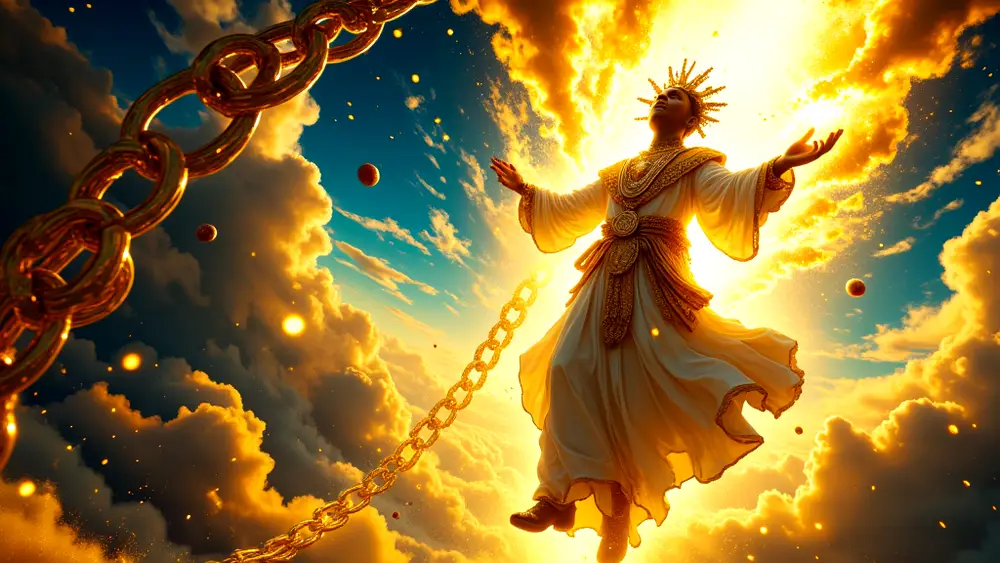
They are basic rules of how the world works. When Orunmila came to Earth (some say he used a gold chain), he brought this knowledge in palm nuts called Ikin. This became the way to share godly wisdom with people. Some stories say he learned it all over 16 years.
But everyone agrees these patterns let Ifá priests see what will happen and know what to do. They can understand the hidden rules of life.
How People Use Ifá Divination
Ifá divination is a system to understand spiritual problems. It works carefully like doctors do, but with ancient knowledge. A trained priest called Babalawo uses the Opele chain. This sacred tool has eight halves of palm nuts on a chain. The story says Orunmila made it to help share divine wisdom.
Here’s how the divination works:
- Casting the Opele: The Babalawo throws the chain on a wooden tray called Opon Ifá. He reads the pattern that forms to find the first Odu (sacred pattern).
- Consulting the Odus: Then he remembers the matching verses called ese Ifá. This works like checking a reference book.
- Giving Advice: Finally, he suggests offerings or actions based on the Odu and the person’s problem. This is how people get answers.
Some places use palm nuts instead of chains. But all follow Orunmila’s original method. The eight parts of the chain stand for his first eight students. So each reading brings them together again.
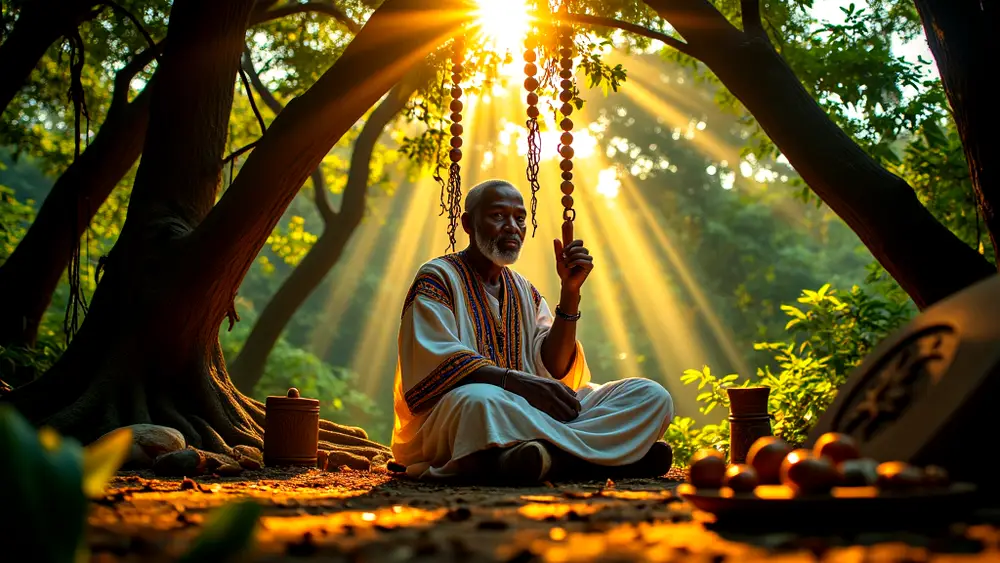
Tales and Legends About Orunmila
Orunmila did more than just divination. Many Yoruba myths tell about his wisdom. These stories show how he knew what would happen before it did. They tell about his big influence on both gods and people. The stories explain how he changed what happened to people and solved problems among the gods.
Orunmila and the King’s Lost Son
One well-known story tells about a worried Yoruba king. His son who would become king disappeared. This caused problems for the kingdom. Food became scarce and other leaders made plans against him. The king’s own diviners couldn’t help. Then they asked Orunmila. Orunmila used his Opele chain. The Odu Otura Meji showed the truth. No one took the prince.
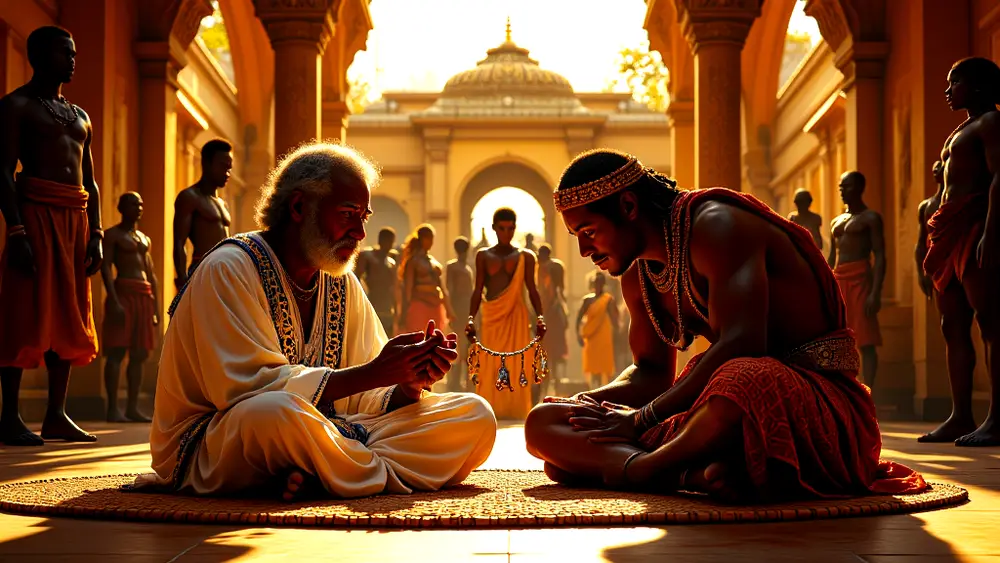
Instead, ancestral spirits led him into the holy forest. They wanted to test if the kingdom still honored them. Orunmila told them exactly what to offer: sixteen kolanuts, white cloth, and one sacrificial ram. They placed these at the forest edge when the moon was new. This broke the spirits’ power. The prince came out safely. He had a strange gourd that later held medicine.
This medicine saved people from disease. Some say these spirits were really the king’s family spirits they forgot about. So the story teaches about remembering ancestors. It shows two things Ifá does: finds hidden truths and fixes problems between people and spirits.
The story explains how Orunmila used divination to reveal that ancestral spirits took the prince to test the kingdom’s loyalty, then guided the people to make offerings that brought him back safely while teaching the importance of honoring ancestors.
Orunmila’s Clashes with Eshu
Orunmila and Eshu had a big disagreement. This shows an important relationship in Yoruba stories. Eshu is the trickster god who causes trouble. One story in the Odu Ogunda Meji tells what happened. A king sent messengers who wanted Orunmila’s advice. Eshu tricked them on purpose. He swapped their gifts and changed their messages. He wanted to start a fight.
But Orunmila used Ifá divination to learn the truth. Then he left special offerings at a crossroads where Eshu lives. This showed that even wise gods must deal with Eshu’s tricks. Some say these weren’t real fights. They say both gods planned them as important teachings. Eshu wanted to see how much Orunmila knew. This helped Orunmila become wiser.
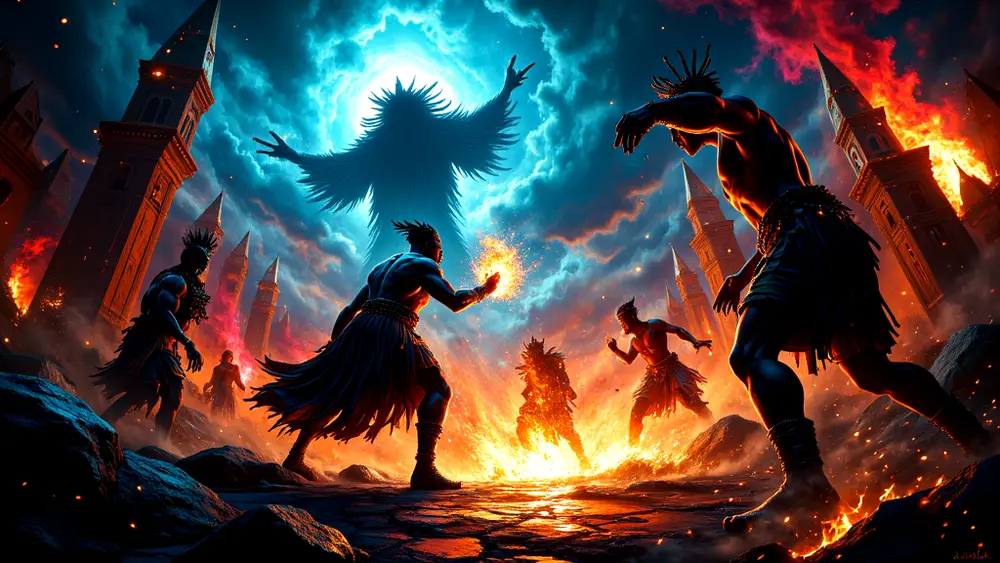
Signs and Ways to Honor Orunmila
We looked at Orunmila’s wisdom in stories. Now we’ll see how people still honor this wise god today. These religious actions keep his advice that still helps people. They show respect to Orunmila through special practices.
Sacred Objects Linked to Orunmila
Yoruba tradition uses special objects that connect people to Orunmila’s wisdom. These items have deep religious meaning from old Ifá practice. People chose their shapes and materials to show different parts of Orunmila’s power.
First, the Ikin Palm Nuts:
- These sixteen palm kernels come from oil palm trees
- People believe they hold the same power Orunmila used to make the Odus
- Diviners shake them and read how they fall to get messages
Next, the Opele Chain:
- This chain has eight seed pods that can be metal or ivory
- It shows Orunmila’s first eight students
- When thrown, which way the pods land makes the Odu patterns
Last, the White Beads (Iyun):
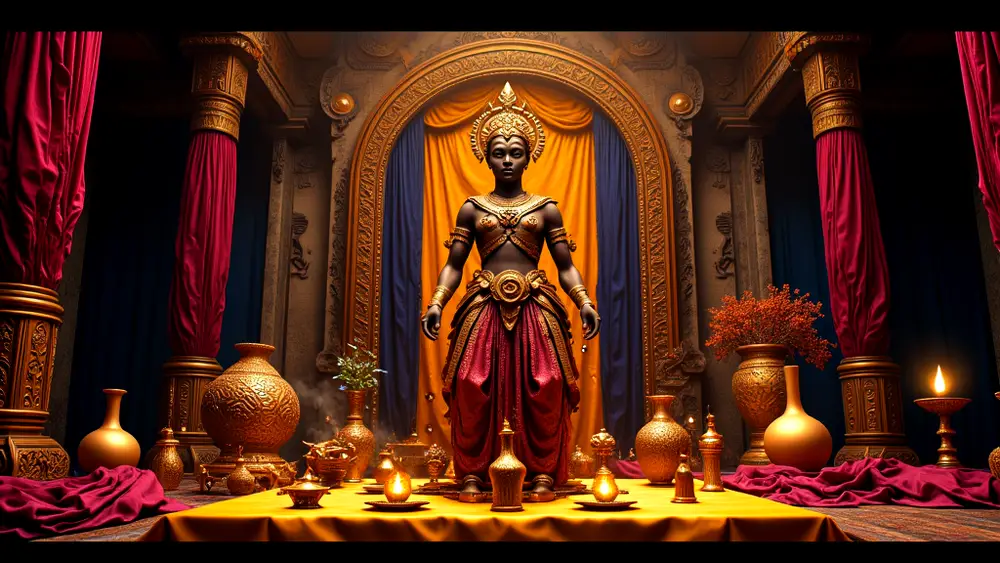
- People wear them as necklaces or bracelets
- The white color means clear understanding
- They connect Orunmila to Obatala, the purity god
- White was chosen because you need clear thinking to understand Ifá
How People Worship Orunmila
People honor Orunmila through specific ceremonies and gifts. These follow old Ifá traditions. Each item has deep meaning that links our world with the spirit world. Ifá priests have taught these practices for many generations. They keep the important connection between people and this wise god.
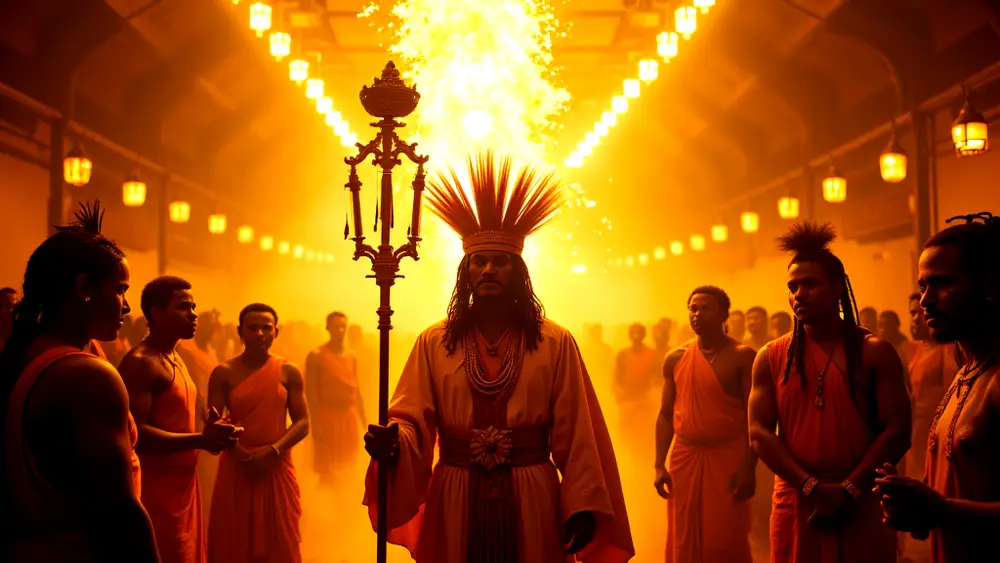
First, Kolanuts (Obi Abata):
- People use these bitter nuts as the main gift for Orunmila
- They believe the nuts carry prayers to him
- During rituals, priests split them open
- Then they read the inside patterns as messages
- Four parts show the four directions and Orunmila’s great wisdom
Next, White Cloth (Aso Funfun):
- People drape pure white fabric on shrines or wear it
- This shows spiritual cleanliness and clear sight
- It reminds people that Orunmila sees all futures
- White was chosen because it means new beginnings
Last, Palm Oil (Epo Pupo):
- People use this golden oil to bless sacred objects
- It stands for life power and spiritual light
- Different areas use exact amounts – usually 16 or 8
- These numbers match the Odus system
Orunmila Compared to Other Gods
We looked at Orunmila’s special qualities in Yoruba tradition. Now we can see how this god matches up with other wisdom gods from world stories. These comparisons show what different cultures share about how gods share knowledge. Many stories about gods have similar ideas about wisdom.
Family of Yoruba Gods
Orunmila is part of a large group of Yoruba gods. This group has important gods like Olodumare, who made everything, Olorun the sky god, Shango the warrior, and Eshu who plays tricks. If you want to learn more, you can check this list of all the African Gods. It shows every Yoruba god and other African spirits.
FAQs
1. Is Orunmila the same as Ifá?
Orunmila is not the same as Ifá, as he is the deity of wisdom who presides over the Ifá divination system.
2. How is Orunmila worshipped today?
Orunmila is worshipped today through rituals like kolanut offerings, white cloth sacrifices, and Ifá divination ceremonies led by initiated Babalawos.
3. What’s the difference between Orunmila and Obatala?
The difference between Orunmila and Obatala lies in their domains: Orunmila governs wisdom and divination through Ifá, while Obatala is the creator deity of purity and human form.
4. Can anyone learn Ifá divination?
Can anyone learn Ifá divination depends on dedication and initiation under a Babalawo, as the practice is traditionally taught within Yoruba spiritual lineages.

